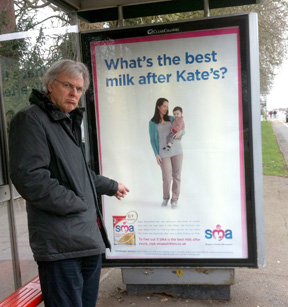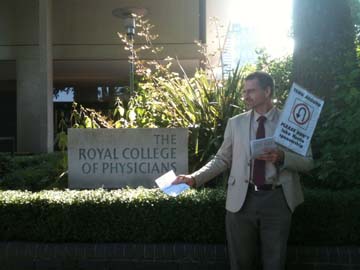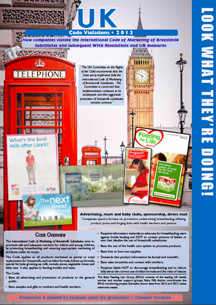Should Kate breastfeed? It's none of our business. Here's what is our business.
Kate, Duchess of Cambridge, has not yet given birth and people are telling her how to care for her child. The Guardian reported yesterday that a TV presenter had "called upon the duchess to become an advocate for breastfeeding." It is enough to have advice coming from all sides from family and friends, without trying to satisfy the demands of a nation, particularly with regard to one of the most immediate, fundamental and intimate aspects of nurturing the precious new-born gift when it arrives.
I don't think it is our business how Kate or any mother feeds her child - but there is plenty we can be doing to ensure that mothers have the support they require and deserve. In fact, it would be great if the energy and media attention expended on offering unwanted advice to Kate was applied where it is really needed: protecting the right to accurate, independent information for mothers, stopping misleading promotion of formulas (such as the "What's the best milk after Kate's?" formula advertising campaign), ensuring mothers who do use formula have information on how to reconstitute it properly and allowing mothers to breastfeed, instead of consigning them to toilets to do so.
The right to accurate, independent information

If Kate has signed up to Danone's mum and baby club, about now, approaching her due date, she would receive an email from Danone. Perhaps the one promoting a Cow & Gate bottle feeding starter pack with the message "Complete peace of mind for the first 48 hours" (left - full details in our Look What They're Doing in the UK 2013 monitoring report).
Company marketing strategies such as this are an abuse of the right to accurate, independent information on child care.
This is a right in the legal sense of the word. Article 24(e) of the Convention of the Rights of the Child states that governments are responsible:
"To ensure that all segments of society, in particular parents and children, are informed, have access to education and are supported in the use of basic knowledge of child health and nutrition, the advantages of breastfeeding, hygiene and environmental sanitation and the prevention of accidents."
The UN Committee on the Rights of the Child has repeatedly called on UK Governments to protect this right. In its last report on the UK it said:
"The UN Committee on the Rights of the Child recommends that the State party implement fully the International Code of Marketing of Breast-milk Substitutes.... The Committee is concerned that implementation continues to be inadequate and that aggressive promotion of breastmilk substitutes remains common."
The International Code aims to protect, promote and support breastfeeding AND the proper use of breastmilk substitutes, when these are necessary. It gives responsibility for advising parents to health workers and prohibits companies from advertising products, seeking direct or indirect contact with pregnant women and parents, and putting misleading or idealising information and images on labels.
Stopping misleading promotion of formulas
 Last year Baby Milk Action complained to the Advertising Standards Authority (ASA) about the national billboard, print and online advertising campaign shown left. Wyeth (part of Pfizer Nutrition, now part of Nestlé) promoted its SMA formula brand in a series of advertisements showing mothers with young children under headlines: "What’s the best milk after Kate’s?", "What’s the best milk after Lisa’s?" etc.
Last year Baby Milk Action complained to the Advertising Standards Authority (ASA) about the national billboard, print and online advertising campaign shown left. Wyeth (part of Pfizer Nutrition, now part of Nestlé) promoted its SMA formula brand in a series of advertisements showing mothers with young children under headlines: "What’s the best milk after Kate’s?", "What’s the best milk after Lisa’s?" etc.
Following its investigation, the Advertising Standards Authority (ASA) has ruled the answer is NOT SMA formula.
In a ruling published on 19 September 2012 it warns Pfizer not to repeat the advertisements after finding: "the ads misleadingly implied that follow-on milk was the best alternative to breast milk" and "the ads misleading implied that SMA Follow-on milk was superior to other follow-on milks".
Further examples of misleading promotion are given in the Look What They're Doing in the UK 2013 monitoring report, we produced on behalf of the Baby Feeding Law Group.
Companies cannot be trusted to provide accurate information on their products - and we should not be surprised that they feel under pressure to idealise their products to boost sales. They are duty bound to their shareholders to increase the value of the company and executives compete with breastfeeding, while hiding risks of formula feeding. Until regulations were introduced in the UK, they refused to warn on the labels of powdered formula that this is not a sterile product or to provide information on the simple steps required to reduce the risks from possible contamination with harmful bacteria.
Companies spend a fortune on promotion; promotion prohibited by the marketing requirements they should respect. This goes on the price of formula and is funded by parents who buy it. This is why we have a No promotion - Chepaer formula campaign. Companies also push unnecessary products such as follow-on formulas and so-called growing-up milks using misleading claims. They are simply ripping parents off. This campaign is particularly important as we hear increasingly of parents requesting formula from food banks as they cannot afford it.
 When Nestlé completed its takeover of Pfizer Nutrition/Wyeth and the SMA brand in December 2012, Baby Milk Action asked it to respect the marketing requirements. Unfortunately, Nestlé is introducing the aggressive marketing practices familiar from other countries and driving down standards in the UK. Things are getting worse, not better.
When Nestlé completed its takeover of Pfizer Nutrition/Wyeth and the SMA brand in December 2012, Baby Milk Action asked it to respect the marketing requirements. Unfortunately, Nestlé is introducing the aggressive marketing practices familiar from other countries and driving down standards in the UK. Things are getting worse, not better.
Just this week, I was demonstrating outside the Royal College of Physicians (RCP), which Nestlé had booked under another name to target health workers - the RCP would not have accepted the booking if they had known it was Nestlé.
Nestlé is trying to circumvent the restrictions many health facilities have in place on company reps. targeting staff. In these facilities, companies can only provide information on their products to a designated expert staff member (or a multidisciplinary committee in some regions), who will assess the accuracy and only pass on what is necessary.
Campaigning can make a difference. Nestlé was to host a similar event in Birmingham today, but yesterday it was shown as cancelled on the company website. For future demonstrations, click here.
Ensuring mothers who do use formula have information on how to reconstitute it properly

Babies fed on formula are at greater risk of illness than babies who are breastfed even in industrialised countries such as the UK. UNICEF has calculated that modest increases in breastfeeding rates here could save the NHS £40 million per year as fewer babies would need to be treated for illness.
Babies who are not breastfed do not have the protection breastfeeding provides. But they are also at risk because formula needs to be prepared carefully. Powdered formula is not sterile and steps to kill any harmful bacteria that may be in the formula shold be followed. UNICEF, Department of Health and others have produced information on how to reconstitute formula correctly to reduce the risks. We called on health bodies to produce a video of how to do so and when nobody else did it, made one ourselves with MarkIt television.
This is now available as an iPhone/iPad app for £2.99 and comes with a film of interviews with experts explaining the differences between the different types of formula on the market. Click here.
These films are included on a DVD for health workers, called Infant Formula Explained. This has an additional 25-minute film of interviews with experts providing more in-depth information on formula. Many health facilities are using this under licence to improve understanding amongst health workers and mothers who intend to use formula. Click here.
Allowing mothers to breastfeed
The Infant Feeding Survey has shown that 81% of mothers start out breastfeeding. While breastfeeding rates then decline rapidly, most mothers who stop in the early weeks say they wanted to breastfeed for longer. These mothers require support, from their health workers and peers, as well as society as a whole, which requires cultural change. One aspect of this is respecting a mothers right to feed her child while she is out and about.
A few years ago, the Scottish NHS ran a breastfeeding promotion campaign that showed mothers breastfeeding in a variety of situations, with a slogan along the lines of "Other people may not notice that you're breastfeeding, but you and your baby will."
Here's one of the television advertisements.
It was making the point that breastfeeding in public is generally something that goes unnoticed.
But that is not everyone's experience and the government has responded by protecting the right to breastfeed in the Single Equalities Bill and highlighted it is protected by others rights. Click here for details.
Mother and spoken-word artist Hollie McNish explains the bad experiences of some mothers in this piece below. It has over 500,000 views already so clearly many mothers relate to being consigned to the toilet to feed their babies. It contains a few mild four-letter words, but what is shocking is the reality she describes.
It is not our business how Kate or other mothers feed their children.
But we can change ourselves and our society to give them all the support they require and deserve.
- Webmaster's blog
- Login to post comments







